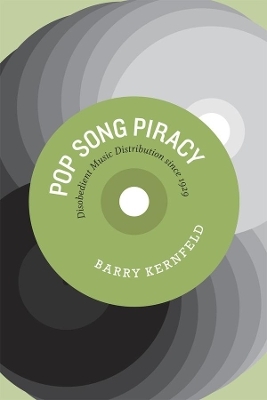
Pop Song Piracy
Disobedient Music Distribution since 1929
Seiten
2011
University of Chicago Press (Verlag)
978-0-226-43183-3 (ISBN)
University of Chicago Press (Verlag)
978-0-226-43183-3 (ISBN)
Starting with music publishers' efforts to stamp out bootleg compilations of lyric sheets in 1929, this title details nearly a century of disobedient music distribution, from song sheets to MP3s.
The music industry's ongoing battle against digital piracy is just the latest skirmish in a long conflict over who has the right to distribute music. Starting with music publishers' efforts to stamp out bootleg compilations of lyric sheets in 1929, Barry Kernfeld's "Pop Song Piracy" details nearly a century of disobedient music distribution, from song sheets to MP3s. In the 1940s and '50s, Kernfeld reveals, song sheets were succeeded by fake books, unofficial volumes of melodies and lyrics for popular songs that were a key tool for musicians. Music publishers attempted to wipe out fake books, but after their efforts proved unsuccessful they published their own. "Pop Song Piracy" shows that this pattern of disobedience, prohibition, and assimilation recurred in each conflict over unauthorized music distribution, from European pirate radio stations to bootlegged live shows. Beneath this pattern, Kernfeld argues, there exists a complex give and take between distribution methods that merely copy existing songs (such as counterfeit CDs) and ones that transform songs into new products (such as file sharing).
Ultimately, he contends, it was the music industry's persistent lagging behind in creating innovative products that led to the very piracy it sought to eliminate.
The music industry's ongoing battle against digital piracy is just the latest skirmish in a long conflict over who has the right to distribute music. Starting with music publishers' efforts to stamp out bootleg compilations of lyric sheets in 1929, Barry Kernfeld's "Pop Song Piracy" details nearly a century of disobedient music distribution, from song sheets to MP3s. In the 1940s and '50s, Kernfeld reveals, song sheets were succeeded by fake books, unofficial volumes of melodies and lyrics for popular songs that were a key tool for musicians. Music publishers attempted to wipe out fake books, but after their efforts proved unsuccessful they published their own. "Pop Song Piracy" shows that this pattern of disobedience, prohibition, and assimilation recurred in each conflict over unauthorized music distribution, from European pirate radio stations to bootlegged live shows. Beneath this pattern, Kernfeld argues, there exists a complex give and take between distribution methods that merely copy existing songs (such as counterfeit CDs) and ones that transform songs into new products (such as file sharing).
Ultimately, he contends, it was the music industry's persistent lagging behind in creating innovative products that led to the very piracy it sought to eliminate.
Barry Kernfeld is on the staff of the Historical Collections and Labor Archives in the Special Collections Library of the Pennsylvania State University. He is the author of The Story of Fake Books: Bootlegging Songs to Musicians and What to Listen for in Jazz, and he is the editor of The New Grove Dictionary of Jazz.
| Erscheint lt. Verlag | 1.10.2011 |
|---|---|
| Sprache | englisch |
| Maße | 16 x 23 mm |
| Gewicht | 454 g |
| Themenwelt | Literatur ► Biografien / Erfahrungsberichte |
| Kunst / Musik / Theater ► Musik ► Allgemeines / Lexika | |
| Recht / Steuern ► EU / Internationales Recht | |
| Recht / Steuern ► Strafrecht ► Kriminologie | |
| ISBN-10 | 0-226-43183-5 / 0226431835 |
| ISBN-13 | 978-0-226-43183-3 / 9780226431833 |
| Zustand | Neuware |
| Haben Sie eine Frage zum Produkt? |
Mehr entdecken
aus dem Bereich
aus dem Bereich
die Geschichte der Schallplatte
Buch | Hardcover (2024)
Prestel (Verlag)
CHF 51,90
Buch | Softcover (2024)
Nomos (Verlag)
CHF 39,95


